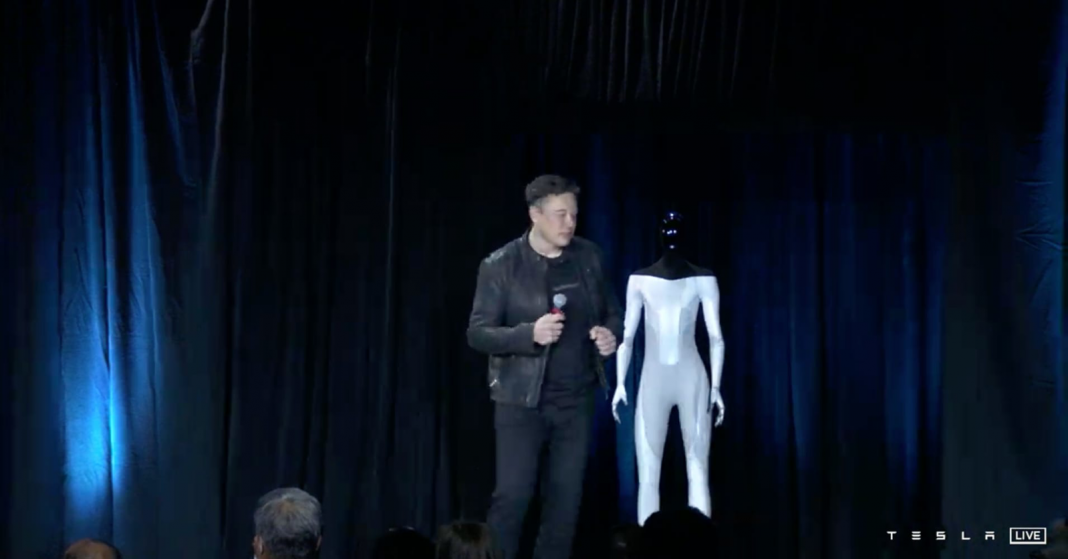For years, Tesla CEO Elon Musk warned people about the dangers of AI-powered robots, even predicting “scary outcomes” like in “The Terminator.” Now, he seems to be taking matters into his own hands before humanity is overrun.
The electric vehicle company will manufacture a humanoid robot prototype dubbed the “Tesla Bot,” Musk announced at Tesla’s Artificial Intelligence (AI) Day on Thursday. According to Musk, the prototype will be completed sometime in 2022, though the billionaire entrepreneur is known for blowing past his own publicly stated deadlines on large, flashy projects.
For example, in 2016, Musk promised full self-driving vehicles by 2018, writing on Twitter: “In ~2 years, summon should work anywhere connected by land & not blocked by borders, eg you’re in LA and the car is in NY.”
When that didn’t happen, the billionaire entrepreneur promised that Tesla would supply the roads with 1 million “Robotaxis” by 2020. Last spring, he softened his tone during Tesla’s first-quarter earnings call, noting that “punctuality is not my strong suit.”
Musk has claimed that Tesla’s autonomous vehicles will hit the market shortly after they get regulatory approval across the United States. How his robot will face regulation remains unclear, but one thing is certain: Musk insists it will be amiable.
“It’s intended to be friendly, of course,” Musk said during the Tesla Bot announcement. “And navigate through a world built for humans.”
The sentiment — and, for that matter, the entire nature of the announcement — may come as a surprise to anyone familiar with Musk’s long-standing public views on AI-powered robots.
Musk’s track record of caution against AI robots
While Musk is known for his support and development of artificial intelligence, he’s long opposed the pace of advancement in robotics — often citing a film that came out when he was just 13.
“I like to just keep an eye on what’s going on with artificial intelligence,” Musk told CNBC’s Closing Bell in 2014, adding: “There have been movies about this, you know, like ‘[The] Terminator.’ There are some scary outcomes.”
In 2017, Musk publicly referenced “The Terminator” again, citing his neurotechnology startup Neuralink — which aims to develop brain implants for humans to interface with machines — as a preventative tool against a threat like Skynet, the 1984 movie’s AI antagonist. “That is the aspiration: to avoid AI becoming other,” he wrote on Twitter.
Later that year, Musk doubled down on his warning while speaking at that year’s annual summer meeting of the National Governors Association, a Washington, D.C.-based nonpartisan political organization. “Robots will be able to do everything better than us,” Musk said during his speech. “I have exposure to the most cutting edge AI, and I think people should be really concerned by it.”
Shortly thereafter, Musk tweeted some additional commentary — this time, centered on a viral video of a parkour-performing robot made by Waltham, Massachusetts-based robotics firm Boston Dynamics: “This is nothing. In a few years, that bot will move so fast you’ll need a strobe light to see it. Sweet dreams…”
Questionable timing for the announcement
According to the presentation’s briefing slides, the robot — codenamed “Optimus” — will stand 5-foot-8, weigh 125 pounds, have human-like hands and feet, contain a visual sensor to help it “see” and ultimately work to eliminate “dangerous, repetitive, boring tasks.”
“[You can] talk to it and say, ‘Please pick up that bolt and attach it to a car with that wrench,’ and it should be able to do that,” Musk said. “‘Please go to the store and get me the following groceries.’ That kind of thing. I think we can do that.”
Some Wall Street analysts are questioning the timing of Musk’s announcement. Daniel Ives, a Tesla analyst at Wedbush Securities, called it a “headscratcher” in a post-announcement report on Friday, comparing the announcement to Robotaxis and other “future sci-fi projects.”
“While we appreciate Musk’s longer term technology vision,” Ives wrote, “A Tesla Bot is not what investors want to see.”
Indeed, Musk noted on Thursday that the decision to build “Optimus” was not prompted by specific manufacturing needs, but instead because Tesla now has the capability to do so. “We’re [already] making the pieces that are needed for a useful humanoid robot,” said Musk, offering no further explanation for how Tesla will safeguard against his long-held concerns.
He also cast a somewhat shaky vote of confidence that, if needed, humans could defend themselves against the Tesla Bot: “Hopefully that doesn’t ever happen, but you never know.”

